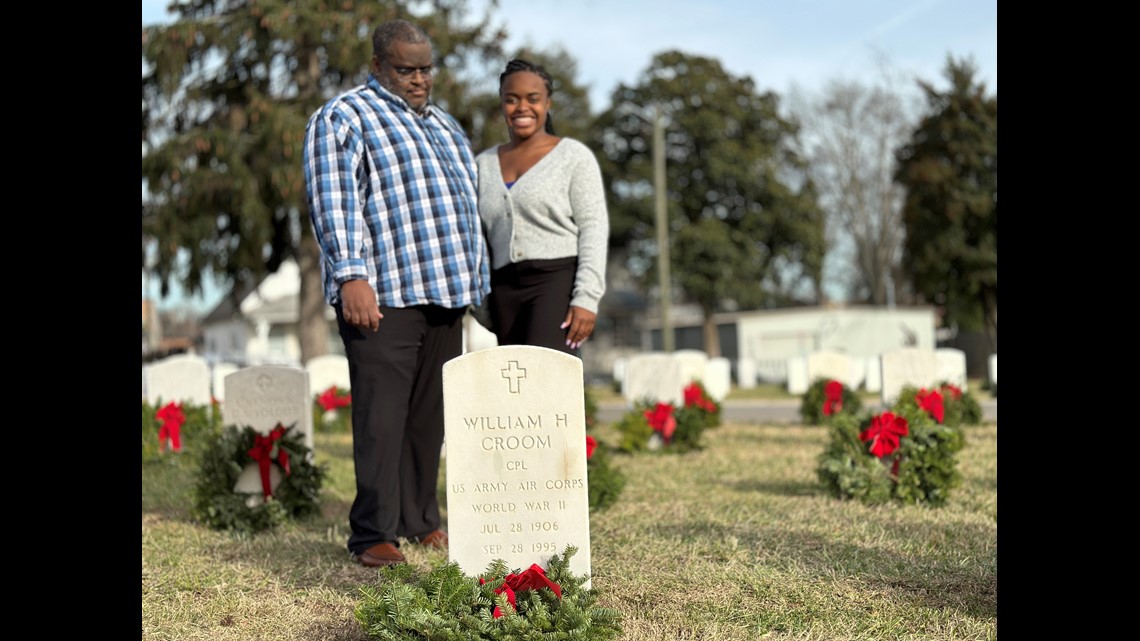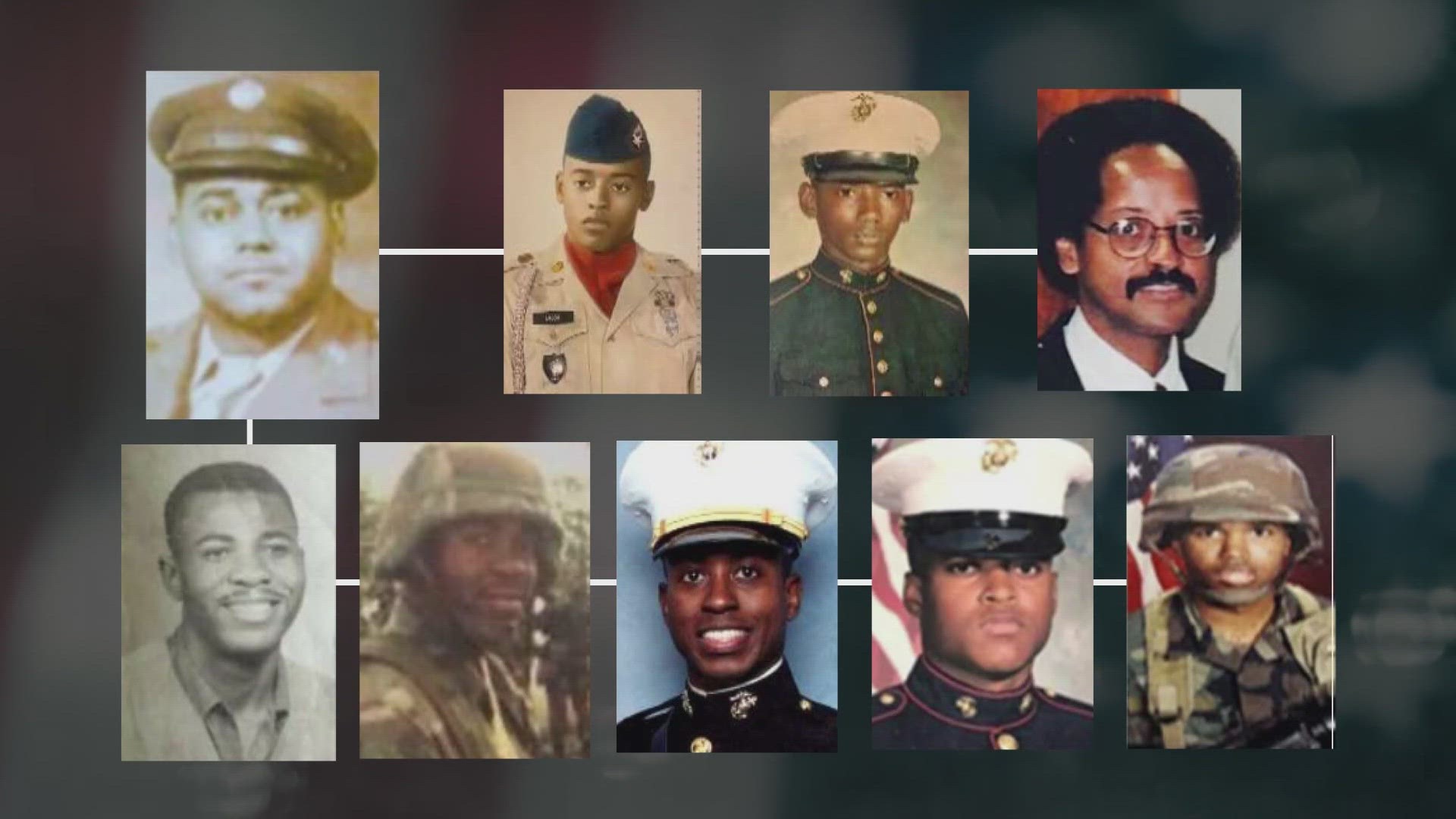KNOXVILLE, Tenn. — The tradition of service for military families often runs deep, and that notion holds true for generations of the Croom family.
“(They) gave us the blueprint for what we felt we needed to do, as not only members of our family but members of this country,” said Jered Croom referencing the late patriarch of the Croom family, William H. Croom.
William was a veteran of the U.S. Army Air Corps during World War II. It was the service of his grandfather and his uncle, Paul, who Jered Croom credits for helping inspire him to join the Marines.
“If you look at the historical reference of African Americans in this country, and service to this country, we have risen to answer the call time and time again, since the Civil War,” said Croom.
In addition to our on-camera interview with Jered Croom and his uncle, Paul Croom, now living overseas, they answered ten questions about how their military service in the Marine Corps shaped their lives. You can read their answers below.


10 Questions: Jered Croom
1. What one person influenced you most in life?
I would say that my mother has been one of the most influential people in my life. She taught me through example that you don’t have to accept what the world thinks, you have the power to define yourself and your path. She also showed me that you can overcome obstacles with a discipline, planning and support of family and that service to the community is essential to your soul.
2. Do you feel honored and respected for serving your country?
I feel that many people take military service for granted and feel a “thank you for service” is all that is needed. It’s something that someone else will do and that we can resign veterans to a day of celebration and not understand that all those who served have a myriad of issues that deserve confronting with compassion and respect. I personally feel respected though.
3. How can people thank you for your service?
People can thank a veteran for their service by being a complete citizen and get involved in your community by voting, empowering the youth and more.
4. How do you honor your fellow service men and women?
I have spent much of my adult life in social services where I’ve been intentional in ensuring that veterans receive help with honor and respect. I’ve sat and listened to men and women work through many painful situations and helped them find a light in very dark places.
5. How do you think this generation of military men and women is different or similar to yours?
Every man and woman who put on the uniform has made sacrifices. We have ended an era of nearly 2 decades of war and a population trying to find the way back to normal. I think all veterans want to find a way to integrate their military service into their civilian life and feel respected and honored.
6. What influence did your military service have on the rest of your life?
Military service in the Marine Corps taught me how to deal with discomfort with focus and see obstacles as opportunities. It also taught me that there is no more powerful connection than the person next to you that endures through good and bad with you on a path to completing the mission at hand. I’ve learned that the impossible can be done if you’re willing to do the impossible to get there.
7. Does your family have a history of military service?
Yes. I am honored to have several generations of military service on both sides of my family. The earliest that I’m aware of is WW2 where my grandfather brought back pictures of that war that would make a huge impact on me growing up.
8. Would you encourage younger generations in your family to join the service?
I would encourage them to examine if military service is the best way to achieve their goals and if they can commit to a life of service to an ideal that may seem futile at times, but remains a beacon of what can be if our nation lives up to the ideals of its founding.
9. How has your opinion of war changed?
I hate war. I feel that it’s a complete failure of our human family’s ability to solve problems. With that said I do believe there can be righteous reasons to fight though and lay down your life in service to your fellow warrior and your nation.
10. How did your military experience shape your religious faith?
There are several occasions while serving that I took a deep breath looked around and realized that God was real and I was a small part of a much bigger plan. In regards to my faith, it commanded me to serve humanity to the best of my ability and use all my skills to make sure I leave this world better than I found it.
10 Questions: Paul Croom
1. What one person influenced you most in life?
My mother was the one person who exerted the most influence on me. My mother died when I was 16 but before that horrific time, I saw her struggle to give my six siblings and me the best life that she could generate for us. Her bravery, love and fortitude have served as a model that I have emulated throughout my adult life.
2. Do you feel honored and respected for serving your country?
I don’t feel honored and respected by those in this country for my service in the military. In fact, I feel offended when someone says, “thank you for your service.” I believe that phrase is only an insincere platitude. If my service was really worthy of thanks, why not take better care of our veterans? Why send active duty personnel to fight in wars that have no direct bearing on the safety or security of our country and countrymen? Words do not convey honor and respect; those signs of praise are best shown through deeds.
3. How can people thank you for your service?
I really do not need to be thanked for my service. However, all veterans and active-duty military personnel need to be compensated for their service. That compensation should include a living wage for active duty personnel and physical and mental health care services for veterans. More directly, I believe that the population of the United States should oust those lawmakers who lie and say that they support our military while only supporting the corrupt military-industrial complex with multi-billions of dollars annually.
4. How do you honor your fellow service men and women?
I honor every person that I meet, whether that person has had military service. My idea of honoring a fellow service member (former or current) is to support that person with my deeds and my vote. Being aware of current situations around the world and spreading the truth about where and why our service members are being deployed to dangerous and sometimes isolated locations is—in my opinion—the best way to honor all service members.
5. How do you think this generation of military men and women is different or similar to yours?
I have no way of measuring the similarities or differences between the two groups of service members.
6. What influence did your military service have on the rest of your life?
My military service experience has had a profound effect on my life. Growing up in the segregated south of the United States, I (like other Black individuals) was subjected to consistent methods of control (or brainwashing) whose sole purposes were to make me believe that I was inferior to white individuals. My time in the Marine Corps changed those perceptions.
During boot camp, I was pushed far past what I thought were my physical and mental exhaustive limits. However, during that time I was also competing with other men on as level a playing field as possible. My experiences in the Marine Corps allowed me to chip away at the artificial boundaries that I had imposed upon myself as a result of the many years of being told and shown that I was inferior. That change in attitude towards my abilities has been a platform that has allowed me to accomplish many obstacles during my lifetime.
7. Does your family have a history of military service?
My family does have a history of military service to include: My father, William H. Croom II, U.S. Army Air Corps, World War II; my cousin, Willie Floyd Clemmons, U. S. Air Force, Korean War; my older brother, William H. Croom III, U.S. Army, Viet Nam; my younger brother, Clifford D. Croom, U.S. Army, Cold War; my nephew George Moore, U.S. Army, Operation Desert Storm; my nephew Jered Croom, U.S. Marine Corps, Operation Desert Storm; and my son Paul Croom II, (PJ), U.S. Marine Corps, Operation Desert Storm through campaigns to include those in 2024.
Noteworthy to add is that PJ’s mother Ada N. Croom served in the U.S. Navy, as did all four of her brothers Matthew, James, Simon and Enoch Long. Taken in total, Ada’s portion of the family has provided more than 125 years of military service to the United States Navy.
8. Would you encourage younger generations in your family to join the service?
I don’t believe that military service is for every person. However, I believe that many of our younger citizens would gain a lot from military service, as well as being great military personnel. In short, yes I would encourage members of the younger generation to serve our nation in the military.
9. How has your opinion of war changed?
My opinion of war has not changed during my adult life. The causes of wars are varied and often times shrouded in geo–political policies that are not apparent to the citizenry at the time of the conflict. In addition, often times the average person is not aware of underlying problems until far after the secession of hostilities. With that being said, I believe (and have always believed) that most wars are avoidable. However, too many times the leaders of countries are not capable of negotiating with any other tool but violence.
10. How did your military experience shape your religious faith?
My military experience has had no effect on my religious faith.

